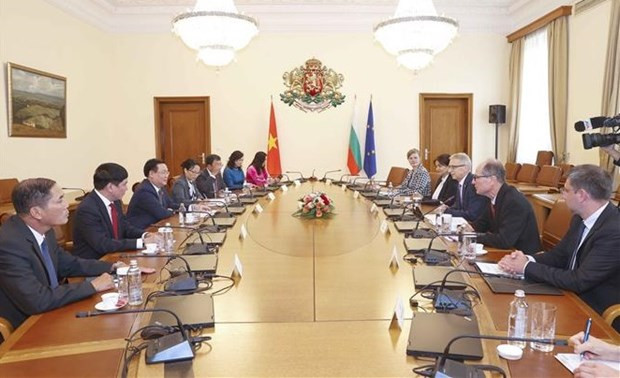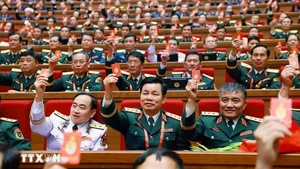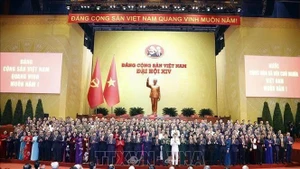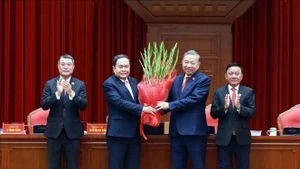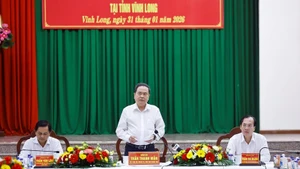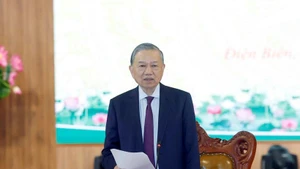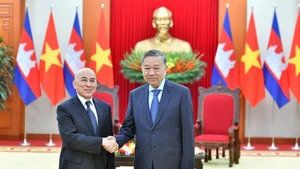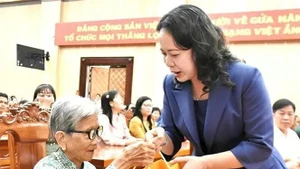During their meeting in Sofia on September 25 as part of Hue's ongoing official visit to Bulgaria, they agreed to encourage the establishment of joint ventures for manufacturing products for export to third countries, tap Bulgaria's expertise and technology, and Vietnam's abundant workforce.
They consented to convene the 24th meeting of the Vietnam-Bulgaria Inter-Governmental Committee this year to review and coordinate specific measures to boost bilateral economic, trade, and investment ties.
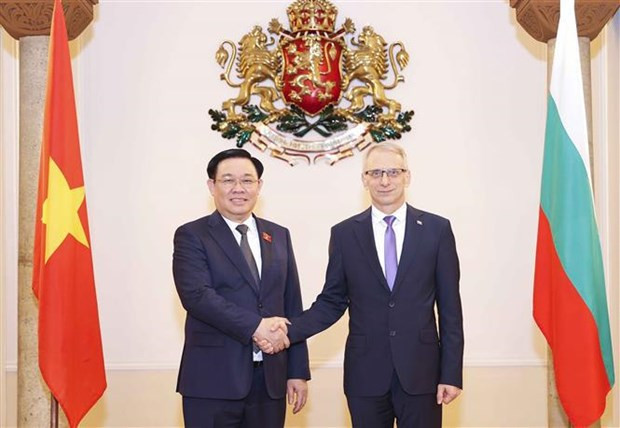 |
| National Assembly Chairman Vuong Dinh Hue (L) and Prime Minister of Bulgaria Nikolai Denkov (Photo: VNA) |
Host and guest promised to fostering harmonious economic and trade cooperation in conjunction with collaboration in education, training, culture, tourism, and people-to-people exchanges, based on the signed agreements, especially the five documents inked during Hue’s visit.
On global and regional issues, they concurred on the need to enhance close cooperation and coordination at multilateral and regional forums, particularly at the United Nations, Asia-Europe Meeting (ASEM), ASEAN-EU, and others.
Hue said on the basis of the bilateral traditional friendship, Vietnam supports Bulgaria’s bid to strengthen cooperation with ASEAN and hopes that Bulgaria continues to be an effective bridge to push forward ties between Vietnam and the EU.
Addressing the law policy forum to reinforce bilateral ties in the Bulgarian capital city on September 25, Chairman Hue highlighted economic-trade-investment ties as a significant pillar in bilateral relations.
He hailed the significance of the event at a time when the two countries are celebrating the 73rd anniversary of diplomatic ties. Lauding the recent approval of the EU-Vietnam Investment Protection Agreement (EVIPA) by the Bulgarian National Assembly with absolute consensus, Hue said it is a crucial step towards the effective implementation of the agreement, laying the foundation to consolidate Vietnam's investment relations with EU countries, including Bulgaria.
The top Vietnamese legislator proposed that Bulgaria facilitate the entry of Vietnamese consumer goods and agricultural products such as tea, coffee, seafood, vegetables, tropical fruits, apparel, footwear and handicrafts into Bulgaria. Vietnam, in return, is ready to open its doors to Bulgarian goods, including wheat, vegetable oil, rose oil, dried fruits and wine, he said.
He wished that Bulgaria would urge the European Commission’s early removal of the "yellow card" warning on Vietnamese aquatic products, and call on other nations to expedite the approval of EVIPA and coordinate in the enforcement of EU-Vietnam Free Trade Agreement (EVFTA).
Vietnam welcomes Bulgarian firms to invest in areas of Vietnam’s demand and Bulgaria’s strength such as energy, transportation infrastructure, information technology, biotechnology for the preservation and processing of fruits and vegetables, pharmaceuticals, environment protection, he said, adding that while talking with the Bulgarian leaders, he proposed considering the establishment of joint ventures to invest in each other's market or explore opportunities in third markets.
The Vietnamese National Assembly and Government of Vietnam are committed to continuously striving to offer all possible support to all enterprises, recognising that the success of businesses, including foreign ones, contributes to the overall success of the nation, he said.
As Vietnam is strategically focused on attracting selective investments with a priority to high technology, foundational and supporting industries, electronic components, electric vehicles and batteries, innovation, green economy, digital economy and circular economy, Hue also suggested that both sides explore cooperation opportunities in these areas.
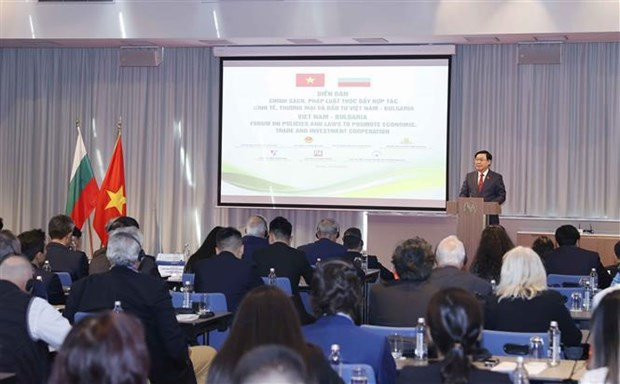 |
| National Assembly Chairman Vuong Dinh Hue speaks at the event (Photo: VNA) |
At the event, leaders of the Ministry of Industry and Trade and the Ministry of Planning and Investment presented Vietnam’s industry, trade and foreign direct investment attraction policies.
A direct trade session between the two countries’ organisations and businesses were also held to share opportunities across a diverse range of sectors, including electricity, energy, aviation, cashew and pepper exports, raw cotton, rice, animal feed ingredients, pharmaceuticals, and food ingredients.
